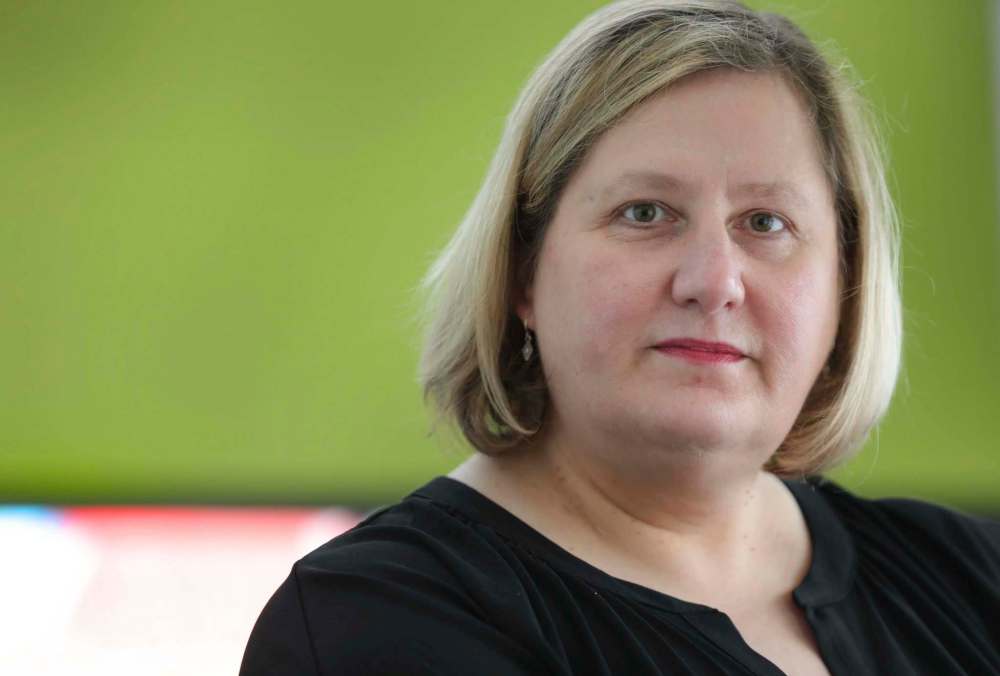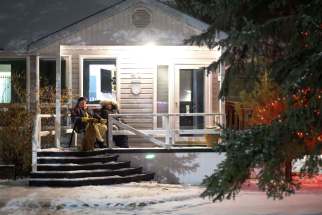Pandemic of loneliness Impact of COVID-19 weighs heavy on mental health
Read this article for free:
or
Already have an account? Log in here »
To continue reading, please subscribe:
Monthly Digital Subscription
$0 for the first 4 weeks*
- Enjoy unlimited reading on winnipegfreepress.com
- Read the E-Edition, our digital replica newspaper
- Access News Break, our award-winning app
- Play interactive puzzles
*No charge for 4 weeks then price increases to the regular rate of $19.00 plus GST every four weeks. Offer available to new and qualified returning subscribers only. Cancel any time.
Monthly Digital Subscription
$4.75/week*
- Enjoy unlimited reading on winnipegfreepress.com
- Read the E-Edition, our digital replica newspaper
- Access News Break, our award-winning app
- Play interactive puzzles
*Billed as $19 plus GST every four weeks. Cancel any time.
To continue reading, please subscribe:
Add Free Press access to your Brandon Sun subscription for only an additional
$1 for the first 4 weeks*
*Your next subscription payment will increase by $1.00 and you will be charged $16.99 plus GST for four weeks. After four weeks, your payment will increase to $23.99 plus GST every four weeks.
Read unlimited articles for free today:
or
Already have an account? Log in here »
Hey there, time traveller!
This article was published 18/12/2020 (1820 days ago), so information in it may no longer be current.
Where the Christmas tree would stand, there’s nothing. This year, François Gauthier can’t muster the energy or spare cash to go out, buy a tree and hang decorations on it.
He looks ahead to the holidays, a time normally bustling with the noise of family and Franco-Manitoban tradition, and sees no escape from the loneliness the pandemic has imposed on him.
“It’s devastating,” he says. “I would try to do the most I can to make it special for my daughter, but with non-essentials not being accessible and not having worked for months, money’s been really tight. I’m struggling to afford everything.”
In March, when the COVID-19 pandemic lockdown descended on Winnipeg, Gauthier had 50 per cent care and control of his daughter, split with his ex.
Because he did essential work for the city’s public works department, he continued to work. However, access to daycare for his 11-year-old daughter dwindled. So, he booked off all his vacation and sick time to stay home with her.
“I would try to do the most I can to make it special for my daughter, but with non-essentials not being accessible and not having worked for months, money’s been really tight. I’m struggling to afford everything.” – François Gauthier
When that ran out, no option remained but for his daughter to stay with her mother, who worked remotely, during the week. She’d visit on the weekends instead. He saw less of his daughter, less of his family, and less of his friends.
The isolation began to wear on him, says Gauthier. And when a gastrointestinal infection of some kind — doctors could not tell him more than that — coincided with the falling apart of a personal relationship, something triggered inside him.
Now, he’s devoid of energy and motivation, and public places spark intense anxiety, he says. Compounding everything, code red pandemic restrictions have cut Gauthier off from his support system, just when he needed them most.
“It’s to the point where I’m begging my family and my brother: please let me come to your house. I need to get out of my house. I need to get out of this hole,” says Gauthier.
He is far from alone in facing such difficulties.
Since the pandemic began, Statistics Canada surveys have shown a significant decline in self-reported mental health across all ages, save those 65 and older. Barely half of people in the 37-year-old Gauthier’s age group are reporting very good mental health, down around 15 per cent from pre-pandemic numbers.

Widespread loneliness contributes to this problem, says Sheryl Giesbrecht of the Canadian Mental Health Association.
“(Loneliness) actually can have both mental health effects and physical health effects,” she says. “Studies equate loneliness to being equal, in terms of detrimental effects, to 15 cigarettes a day.”
Loneliness can inflict greater damage than obesity, Giesbrecht says.
It increases the risk of diabetes, dementia and heart disease. It can cause anxiety, depression and sleep problems. And, particularly concerning during a pandemic, it can suppress immune systems, she says.
“We’re protecting our immune systems by isolation — which actually impacts our immune system negatively.”
And everyone is susceptible to loneliness.
“Even in a group of people, we can feel very, very lonely,” Giesbrecht says. “Lonely is a perception of isolation.
“It’s a perception of how we feel. And when we’re disconnected from our communities and we’re not able to participate the way we like to and the way we usually do participate in our communities, loneliness is a natural response.”

More than 9,500 kilometres separate Isabela Bermudez from her community. As an international student from Rio de Janeiro, Brazil, a certain degree of isolation was inevitable. But when COVID-19 began to permeate every vein of global society, her isolation twisted itself into anxiety and an acute sense of loneliness.
“As the pandemic hit, it was just downhill,” says Bermudez. “It got pretty bad, pretty fast.”
Multiple factors fed her anxiety. For one, respiratory conditions have followed her throughout her life.
“I’m quite scared of COVID,” she says. “I have asthma, and I’ve had a previous history with bronchitis. It’s not really nice. I don’t want to be out.”
These conditions prevented her from flying home in the summer to see family. The novel coronavirus has battered Brazil, with around seven million cases, behind only India and the United States, with per capita infections 2.5 times higher than Canada.
Amongst those numbers — Bermudez’s sister, father and grandmother. All three recovered, but the stress of watching their illnesses unfold from afar wore Bermudez down, more so because her mother deals with diabetes and asthma, putting her at greater risk of severe illness should she contract the virus.
“It’s been hard. I can’t figure out what to do or how to respond to it being Christmas, new year’s and not being able to be with anyone around me. My mom is quite upset.” – Isabela Bermudez
Despite having planned to stay in Winnipeg over the holidays, Bermudez says the season worsens her loneliness.
“It’s been hard. I can’t figure out what to do or how to respond to it being Christmas, new year’s and not being able to be with anyone around me,” she says. “My mom is quite upset.”
With isolation pervading the lives of so many, some are reaching out to help.
Elvira Molochkovetski regularly phones two women in their 80s through a program at Jewish Child and Family Service. She calls to chat and check in, generally avoiding difficult topics. “I think it means a lot to them.”
Molochkovetski says even though they might have family in the city, the forced isolation makes them lonely. Phoning regularly gives her “ladies” (as she calls them) something to look forward to as their relationships develop.
“I can definitely say we make plans when the pandemic ends,” she says. “We’re going to meet in the park.”
There are benefits for everyone involved.
“I feel really good after calling someone, because it just warms my heart. I don’t know how to explain it. I do know it’s very meaningful for them because they always tell me, ‘Thank you for calling,’ and they want to feel part of the community.” – Elvira Molochkovetski
“I feel really good after calling someone,” Molochkovetski says, “because it just warms my heart. I don’t know how to explain it. I do know it’s very meaningful for them because they always tell me, ‘Thank you for calling,’ and they want to feel part of the community.”
Many other outreach programs have grown during the pandemic.
Help Next Door MB provides a platform to reach out to ask for a phone call or even for help moving a dresser. Shared Hope provides an online support group designed to give people suffering from “pandemic fatigue” a place to open up and connect with others. Facebook groups such as We got this Canada, Mutual Aid Society, and CareMongering have all stepped up to provide spaces for people to seek community.
At CMHA, Giesbrecht and colleagues have run a number of online workshops to help people with loneliness and well-being.
“We definitely want to focus on self-talk and reminding ourselves that this is a temporary situation and things will get better in the future,” says Giesbrecht.
For some, none of this seems quite enough.
When you’re feeling this way, says Gauthier, it’s hard to summon the motivation to get moving or to reach out. When he sought medical help, he was told he’d have to wait up to eight weeks to see a psychiatrist.
Meanwhile, he’s left alone, feeling much the same as many others.









